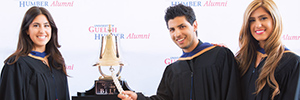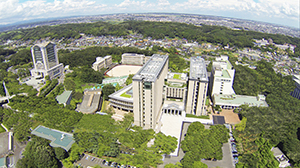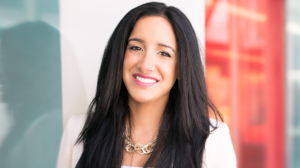Soka Education Research Centre on Global Citizenship (SERC-GC) receives additional funding from the Makiguchi Foundation for Education
The Soka Education Research Centre on Global Citizenship (SERC-GC) at the University of Guelph-Humber has received $150,000 in additional funding over five years, from the Makiguchi Foundation for Education in Japan. This new funding will establish SERC-GC as an official research centre at UofGH, enable students to continue presenting research, and will fund a new Senior Research Supervisor position, which was recently accepted by UofGH Family & Community Social Services (FCSS) instructor (and alumna) Olivia Boukydis.
“I’m thrilled that the Makiguchi Foundation for Education has provided us with this additional funding,” says Dr. Paul Sherman, Program Head of FCSS at UofGH and director of SERC-GC. Now as an official research centre, Dr. Sherman says he hopes SERC-GC will expand its scope of research projects to give students additional research assistant opportunities. He also says having Boukydis on staff as the Senior Research Supervisor will be critical to the Centre’s expansion. “Hiring a research supervisor is going to be very important for us. With Olivia as the senior research supervisor, we’ll have some sustainability and permanence, and someone who can really dive into the work, and that will really help grow the Centre.”
In her new role, Boukydis will act as the point person between students and faculty interested in participating in Soka education research, coordinate those research projects, submit research grant proposals, and support students as they facilitate the research.
Boukydis has been a faculty member on the SERC-GC research team, and has taught in the FCSS program for the past three years. She has participated as a trip assistant with UofGH’s annual Soka education study abroad course, and will additionally continue to teach in the FCSS program.
Making strides in Soka education research
The Soka Education Research Initiative on Global Citizenship (SERI-GC) was launched in 2017 to study the philosophy and practices of Soka (value creating) education, with an emphasis on global citizenship. The first research study – which focused on instructors’ perceptions of experiential learning courses, framed within Makiguchi’s Theory of Value – was presented at three conferences, including at Soka University of America, where students presented the research. A second sister study, which looks at experiential learning from the student perspective, is underway. Dr. Sherman is hoping to add more research projects with this new funding, including in the community.
Dr. Sherman says the Makiguchi Foundation for Education has been impressed with the work that UofGH has done to date in the Soka education research space. “They were quite impressed already with what we’ve done in such a short period of time,” he says. “They thought it was fertile ground and this research would be welcomed here, and also because there isn’t anything like this in Canada. There’s only one other Soka education research centre in North America, at DePaul University in Chicago.”
“We’re very grateful to the Makiguchi Foundation for believing in the program,” adds Boukydis. She says that SERC-GC will not only expand the knowledge of Soka education and philosophy at UofGH, but it will also provide students with valuable research opportunities. “It’s the personal experience and exposure to Soka, this pedagogy that everyone will benefit from – teaching you how to be a global citizen, teaching you how to treat people, how to be connected with people, and also the research components,” she says. “It builds students’ capacity to understand research, to appreciate research, to understand that process – it’s such a great part of our learning experience, and to match that with the clinical experience they have here, it prepares our students really well for whatever they will experience outside of UofGH, whether that’s graduate school or in the workforce. It’s an educational experience in terms of research and the Soka philosophy, looking at life in a way that Soka really fosters.”
She adds: “I hope our students embrace it and really consider it as part of something they want to participate in – whether because of the personal benefits one gets from exploring Soka and value creating, or whether it be the skill-building piece around research. If embraced by everyone, it will be beneficial for the university and our students. And it bridges gaps – that’s what global citizenship is all about, and if it creates a sense of community within the university, we’ll have accomplished our mission of talking about this pedagogy.”








